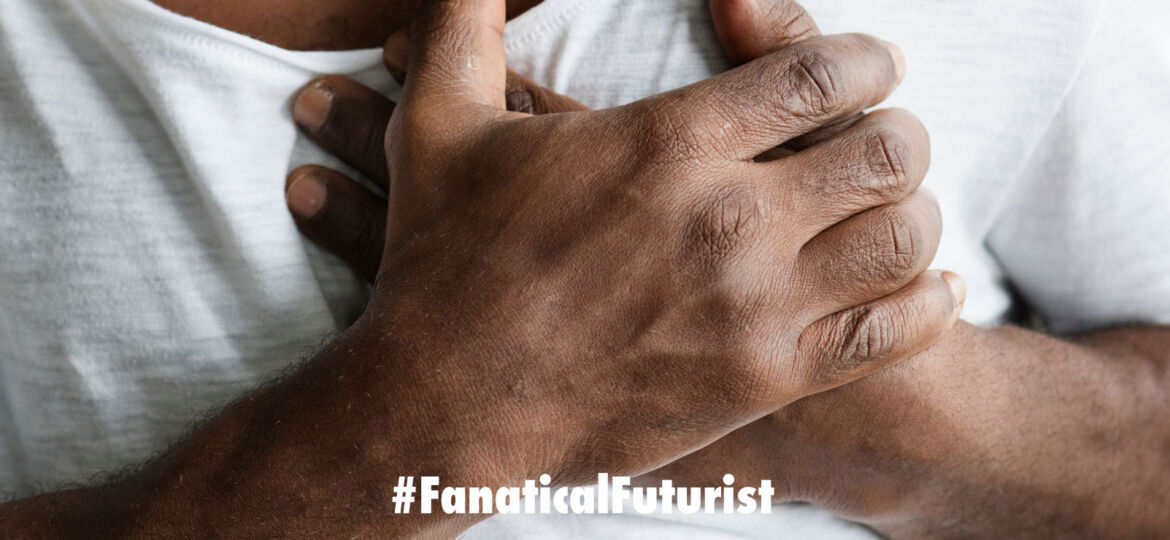
WHY THIS MATTERS IN BRIEF
Technology can do great things and save lives – but only if you give up your right to privacy …
 Interested in the Exponential Future? Join our XPotential Community, future proof yourself with courses from our XPotential Academy, connect, watch a keynote, or browse my blog.
Interested in the Exponential Future? Join our XPotential Community, future proof yourself with courses from our XPotential Academy, connect, watch a keynote, or browse my blog.
We already live in a world where a simple selfie can tell companies about your character, your personality, and even your intent to criminality – let alone your general emotional state or health – but now a new algorithm has been developed to detect coronary artery disease solely from nothing more than patients facial photos. The proof-of-concept, published in the European Heart Journal, needs more refinement before it becomes a useful clinical tool but independent experts are already suggesting there are profound ethical considerations that need to be resolved before a system like this can even think about being deployed in the wild.
Alopecia, Xanthelasmata, a yellowing on the eyelids, and Arcus Corneae, an opaque ring around the cornea, are among several facial biomarkers to indicate a person may be suffering poor cardiovascular health. A team of researchers from China has now developed a deep learning algorithm that can study just four photos of an individual to determine a person’s risk of coronary artery disease.
Over two years, between 2017 and 2019, the researchers recruited 5,796 patients who had presented at a hospital to undergo heart imaging procedures. Four photos were taken of each patient – two side profiles, one frontal, and one looking down at the top of the head.
A deep learning algorithm was then trained to study these four images and assess a person’s heart disease risk. The results, validated in a further 1,000 patients, saw the algorithm correctly detecting heart disease in 80 percent of the cohort. Additionally, the algorithm could accurately detect patients without coronary artery disease 61 percent of the time.
“The algorithm had a moderate performance, and additional clinical information did not improve its performance, which means it could be used easily to predict potential heart disease based on facial photos alone,” says Xiang-Yang Ji, one of the researchers working on the study. “The cheek, forehead and nose contributed more information to the algorithm than other facial areas. However, we need to improve the specificity as a false positive rate of as much as 46 percent at the moment, without further improvement, may cause anxiety and inconvenience to patients, as well as potentially overloading clinics with patients requiring unnecessary tests.”
Obviously the accuracy of the algorithm is nowhere near what would be needed to roll it out into clinical environments, but the research team is cognisant of the algorithm’s current limitations and clearly understands further development and validation is necessary.
“To our knowledge, this is the first work demonstrating that Artificial Intelligence (AI) can be used to analyse faces to detect heart disease,” says Zhe Zheng, lead on the new research. “It is a step towards the development of a deep-learning-based tool that could be used to assess the risk of heart disease, either in outpatient clinics or by means of patients taking ‘selfies’ to perform their own screening.”
An editorial from two University of Oxford cardiovascular experts acknowledge the potential benefits for this kind of AI assisted diagnostic is immense. Charalambos Antoniades and Christos Kotanidis, who did not work on this current research, point out that although this technology is not ready to be deployed, these kinds of innovative diagnostics could “revolutionise medicine as we know it.”
However, Antoniades and Kotanidis do note there will considerable ethical challenges faced once these diagnostic tools are good enough for prime time. Of particular concern is the potential for non-medical professionals to collect this kind of private health information which, in the case of insurance companies, would then give them grounds, for example, to deny you life insurance or health cover, and so on.
“… such a technology may raise concerns about misuse of information for discriminatory purposes,” the pair write in their editorial. “Unwanted dissemination of sensitive health record data, that can easily be extracted from a facial photo, renders technologies such as that discussed here a significant threat to personal data protection, potentially affecting insurance options.”
Peter Bannister, from the Institution of Engineering and Technology, also echoes these concerns. Bannister suggests, although this kind of diagnostic tool promises “great benefits” as an early-stage detection tool, the significant ethical concerns surrounding misuse must be addressed before the technology is deployed.
“Given that the algorithm makes a determination about health based on easily obtainable ‘selfies’ at a stage before the patient themselves might be aware they have the condition, it raises concerns that the algorithm could be maliciously applied on data in the public domain, for example a screenshot from a web conference call being used to discriminate against someone on the basis of their future health insurance premiums,” says Bannister.
The research team behind this new diagnostic algorithm seems well aware of the ethical minefield in their research. Zheng says resolving these issues of privacy will be fundamental as their research progresses and the algorithm’s accuracy is improved.
“Ethical issues in developing and applying these novel technologies is of key importance,” says Zheng. “We believe that future research on clinical tools should pay attention to the privacy, insurance and other social implications to ensure that the tool is used only for medical purposes.”
The new study was published in the European Heart Journal.
Source: European Society of Cardiology
















[…] we can use Artificial Intelligence (AI) to gauge someone’s character, health, personality, and trustworthiness, as well as determine whether or not they’d be a good hire or […]